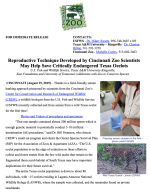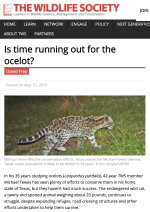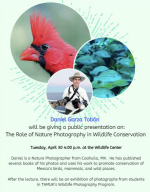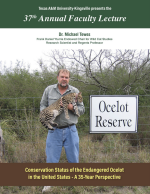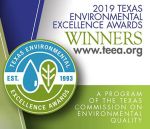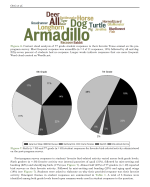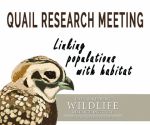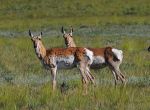
All News
CINCINNATI (August 19, 2019) – Thanks to a field-friendly semen banking approach pioneered by scientists from the Cincinnati Zoo’s Center for Conservation and Research of Endangered Wildlife (CREW), a wildlife biologist from the U.S. Fish and Wildlife Service (USFWS) recently collected and froze semen from a wild Texas ocelot for the first time!
(Published by the The Wildlife Society - wildlife.org)
In his 35 years studying ocelots (Leopardus pardalis), 42-year TWS member Michael Tewes has seen plenty of efforts to conserve them in his home state of Texas, but they haven’t had much success. The endangered wild cat, a tawny and spotted animal weighing about 20 pounds, continues to struggle, despite expanding refuges, road-crossing structures and other efforts undertaken to help them survive.
Read full article here.
Join us Tuesday, April 30th, at 4:00 pm at the Caesar Kleberg Wildlife Center to hear a presentation by nature photographer, Daniel Garza Tobón, on the Role of Nature Photography in Wildlife Conservation.
This presentation is open to the free and open to the public.
Caesar Kleberg Wildlife Center
1730 W Corral Ave, Kingsville, TX 78363
The narrative from the 37th Annual Faculty Lecture presented by Dr. Michael Tewes is now available online. Read Dr. Tewes' explanation of the conservation challenges facing the elusive ocelot, a decoratively spotted feline adorning natural areas in the Western Hemisphere. Its northern range reaches the southern tip of Texas with fewer than 80 ocelots remaining in two small isolated populations.
Click here to view the narrative.
KINGSVILLE (March 26, 2019) — Dr. Michael Tewes has been studying the elusive ocelot for 35 years. During that time, several ideas have come forward from various agencies and private landowner on how to protect their small number.
Tewes will present the 37th Annual Faculty Lecture at 4 p.m., Monday, April 8, in the auditorium at the Caesar Kleberg Wildlife Center. His program is entitled Conservation Status and Recovery of the Endangered Ocelot in the United States—A 35-Year Perspective.
Texas Native Seeds receives prestige award.
The Texas Commission on Environmental Quality revealed the winners of the prestigious Texas Environmental Excellence Awards today. Governor Greg Abbott and TCEQ commissioners jointly selected the ten winners—based on recommendations from a Blue-Ribbon Committee—in nine categories.
The 27th annual edition of these awards include efforts to use less water or energy, to educate the public about natural resources, and to reduce pollution.
Click here to view Janel Ortiz's article entitled "Wild Birds in the Classroom: Evaluation of Student Affinities, Perceptions, and Attitudes in Response to an Experiential Curriculum".
Presentations are now available online. Please click here to view the pdfs of the presentations given at the meeting.
Hixon was instrumental in preserving Government Canyon State Natural Area. He passed away on July 18 at age 81.
Please click here to view the entire article.
DALHART — Over the last decade or two, pronghorn antelope numbers in the Texas Panhandle have been on the rise.
According to the Texas Parks and Wildlife Department’s pronghorn program leader Shawn Gray, the population has basically doubled over the last 20 years.
It’s a great success story, in part because in the 1960s TPWD had to restock the Panhandle with pronghorns from West Texas. Now pronghorns from the northwestern part of the Panhandle are being used to restock the dwindling West Texas population.
